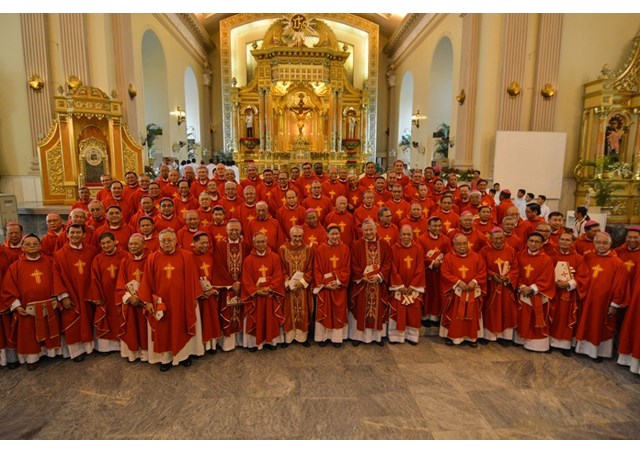
Philippine bishops’ plenary assembly to address Church, national issues

The Catholic bishops of the Philippines are gathering in the capital Manila this weekend not only to discuss important pastoral challenges of the Church and the problems of the nation, but also to elect a new president and other officials for the coming 2 years. The bi-annual plenary assembly of the Catholic Bishops’ Conference of the Philippines (CBCP), July 8-10, comes at a crucial time when the nation is experiencing a war on drugs, an emergence of Islamist terrorism in the south, the revival of the death penalty and other issues. The bishops will start their 115th plenary assembly at the Pope Pius XII Catholic Center on Saturday with a Mass by Archbishop Socrates Villegas of Lingayen-Dagupan, who is ending his term as CBCP President.
Under the presidency of Archbishop Villegas, the Catholic Bishops’ Conference of the Philippines been outspoken against several policies of Philippine president Rodrigo Duterte, whose year-old rule has been largely marked by a brutal war on drugs that has killed an estimated 10,000 suspected drug users and peddlers. After having led the CBCP for four years in two terms, Archbishop Villegas is ending his mandate in perhaps the toughest test of his presidency under Duterte. The Philippine president has not spared the Church, coming out strongly with diatribes and even expletives against the bishops, accusing them of corruption, hypocrisy and womanizing. The 56-year old Archbishop vowed that the Church would “continue to speak against evil," and that its leaders would do this "even if it will bring persecution upon us." CBCP officials have a term of two years in office and another term if re-elected.
Bishops who continue to be influential in a country with Asia’s largest Catholic population, have expressed concern over Duterte's leadership. In a pastoral letter released in January, the prelates denounced as "reign of terror" the government's war on drugs. Last year, upon the election of Duterte, Archbishop Villegas exhorted Filipinos to "stand up for moral rights," "resist moral wrongs," and "stand and defend every person’s life and dignity." The archbishop reminded people about martial law in the 1970s when the country "made a gentle turn to a street called faith that does justice … under the cloud of a military dictatorship and repression."
The conflict in the southern region of Mindanao and its fallout are likely to be in the agenda of the Philippine bishops’ plenary assembly. CBCP secretary-general Father Marvin Mejia said Bishop Edwin Dela Pena of Prelature of Marawi, where fighting is continuing, will lead the discussion. "We've heard so many things coming from the government [and] media, this time we want to hear it from the bishops themselves," said Father Mejia.
Terrorist gunmen allied with the so-called Islamic State (IS) attacked Marawi on May 23, burned the Catholic cathedral and a Protestant school, and took Bishop Dela Pena’s vicar, Fr. Teresito Suganob and several church workers as hostages. Duterte soon went on the offensive declaring martial law in the southern third of the Philippines in order to wrest back Marawi from the terrorists who are using the hostages as human shields. The conflict has dragged on for nearly 7 weeks as terrorist gunmen continue to occupy parts of four villages in the city. According to the government, more than 400 people have been killed, including 351 militants, 85 members of the security forces, and 39 civilians. About 260,000 residents have been displaced.
Fr. Mejia said Bishop Elenito Galido of Iligan, a neighboring diocese of Marawi where displaced families sought shelter, would discuss the "refugee situation in his area." He said that while the rehabilitation of Marawi may be discussed, the main goal of the discussion is "to know the real situation." "After that, it depends on the movement of the spirit if [the bishops] will come up with a statement or a specific programme," said the priest.
The Philippine bishops are also expected to talk about the role of young people in the Church in light of the upcoming Synod on the Youth at the Vatican in October next year. The goal will be to gauge the present state of youth culture with respect to the Catholic faith in the country, that will celebrate 500 years of the arrival of Christianity in 2021. To prepare for it, the bishops have invited a certain group to discuss their study on the Filipino youth culture. The Philippine Church will also have a sizeable presence at the upcoming Asian Youth Day in Yogyakarta, 30 July – August 9.
Fr. Mejia said there will also be discussion on the “new formation program for priests” in preparation for the local Church’s observance of the Year of the Clergy and Consecrated Persons in 2018.
The plenary assembly of the Philippine bishops meets in regular session twice a year in January and in July. When the assembly is not in session, a permanent council acts for the conference. CBCP currently has 131 members, 83 of whom are active, or those who handle archdioceses or dioceses, five are administrators, and 43 are retired. (Source: CBCPNews/UCAN)
| All the contents on this site are copyrighted ©. |


